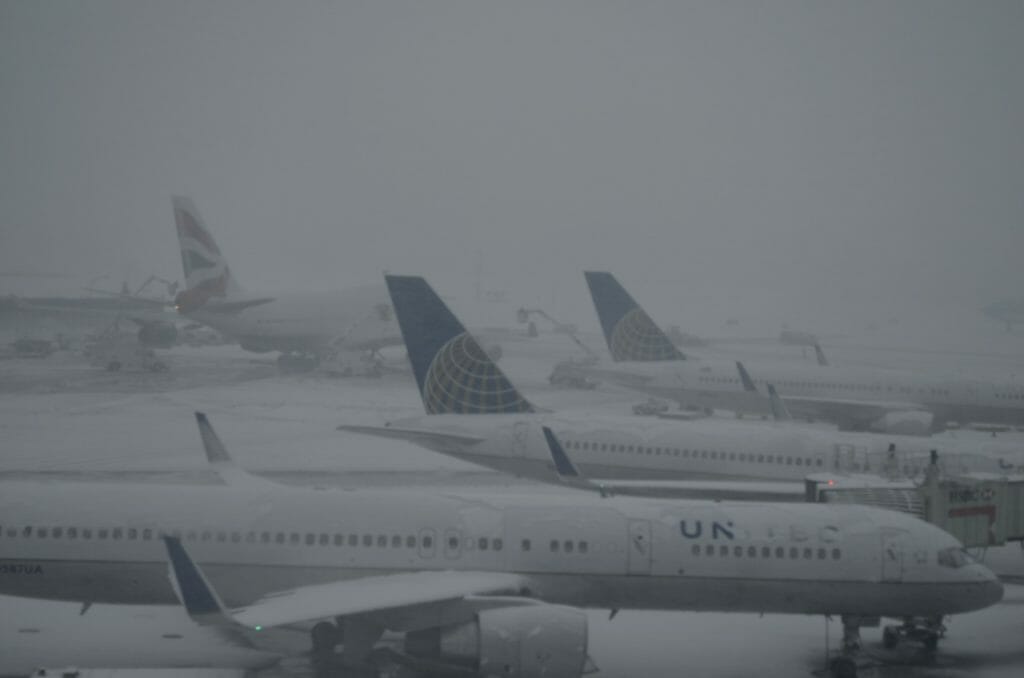Travel problems are inevitable in the winter time. Here's how to avoid the worst of them.
January 20, 2016 by Charlie Eisenhood in Analysis with 1 comments
As a potentially historic winter storm converges on the east coast this Friday and Saturday, teams and tournaments are closely monitoring the weather forecasts to see whether a cancellation might be required.
While many tournaments do forge on in spite of unpleasant weather, travel is often the bigger concern. In large winter storms, many flights are delayed or cancelled and road travel can be treacherous.
Here are some keys to mitigating major travel headaches when the weather worsens.
Take Advantage Of Fee Waivers
When winter storms are clearly going to affect air travel, airlines will issue fee waivers to allow you — within a particular window of time — to change your flight booking, cancel free of charge, and even switch to a more expensive flight without having to pay a fare difference.
United has already issued a fee waiver for this weekend for anyone whose travel is booked for Jan. 22-24 through nearly every major east coast airport from North Carolina to New Hampshire. Other airlines should follow suit within the next 24-48 hours. UPDATE: Southwest, Delta, Frontier, and Virgin have waivers for most Northeast airports.
If you’re fairly sure your tournament will be happening, but risk a cancellation if you try to stick with your current flights, call your airline and see if you can get booked onto a flight before the storm hits.
Agents are often able to help you re-route around a storm by switching airports as well. Of course, you can always wait to see what the tournament decides to do, but by then it can often be too late to rebook before all flights get grounded.
Be Proactive
As a corollary to the above, it is best to take action as soon as you recognize that travel is likely to be disrupted. If you have flexible travel plans, try to rebook so that you avoid the storms. Empty seats will fill fast as other travelers do the same, so speed should be a priority.
If you’re ever in an airport and you anticipate a cancellation (sometimes weather far from your airport can cause the inbound flight to get canceled, which effectively cancels yours!), get in touch with the airline immediately. The early bird gets the worm in these cases.
Remember that major storms cause massive customer service backups for airlines. Try using Twitter to get in touch, which can often be quicker than waiting on hold.
When you are booking flights during the winter, it is often smart to book flights that leave early in the morning, fly nonstop whenever possible, and, if connecting, avoid connections in notoriously delay-prone cities like Chicago.
Use The Right Credit Card
When you are booking travel (particularly airfare) during the winter or other times when cancellations and delays are frequent, make sure to use a card that comes with benefits that can help you if you run into problems.
Generally, airlines are not liable for helping you out if your flight gets canceled and you are forced to book a hotel room. However, many travel credit cards come with Trip Delay Protection that will reimburse up to $500 in necessary expenses (like accommodations and food) if your trip is delayed by more than 12 hours.
Last year, my return flight to New York from Charlotte got canceled while I was reporting at the Queen City Tune Up. Because I had booked my flight on my Chase Sapphire Preferred card, I was able to have my hotel, dinner, additional rental car costs, and gas fillup covered in full ($330). Yes, I had to fill out some paperwork, but it was not arduous.
Many credit cards from various banks (particularly Chase and Citi) carry this insurance policy as a benefit of being a cardholder. You’ll definitely want to check the fine print, but as long as you save receipts, it is usually not difficult to have your expenses covered.
If You’re Driving, Take Serious Precautions
Many teams will drive through major winter storms to tournaments. While in some situations, it is probably advisable to simply stay home and avoid going out on the roads in perilous blowing snow or icy conditions, there will be many teams who decide to drive on anyway.
If you are going to drive through serious storms, you will want to make sure you have food, water, blankets, hats, gloves, and charged cell phones. You need to make sure you keep gas in the tank.
It is extra important to drive slowly, accelerate and brake slowly, and maintain large distances between other vehicles, especially if visibility is poor. Being sleepy becomes even more threatening than usual; don’t drive tired.
Leave early if you can — you should actively avoid any pressure to drive fast to make it to the tournament in time. Obviously, leaving early enough to miss the storm is also preferable.
Don’t Get Frustrated
Being calm and understanding that the airlines hate the weather problems as much as you do goes a long way. There is simply nothing that airlines can do in many cases. Remembering to be nice will help a great deal. It never hurts to ask; sometimes an agent will go out of their way to help you with rebooking, fee waivers, and more.
And remember that tournament directors hate canceling tournaments. If they do so, it’s for a reason (safety, venue issues, etc.). Be understanding!
